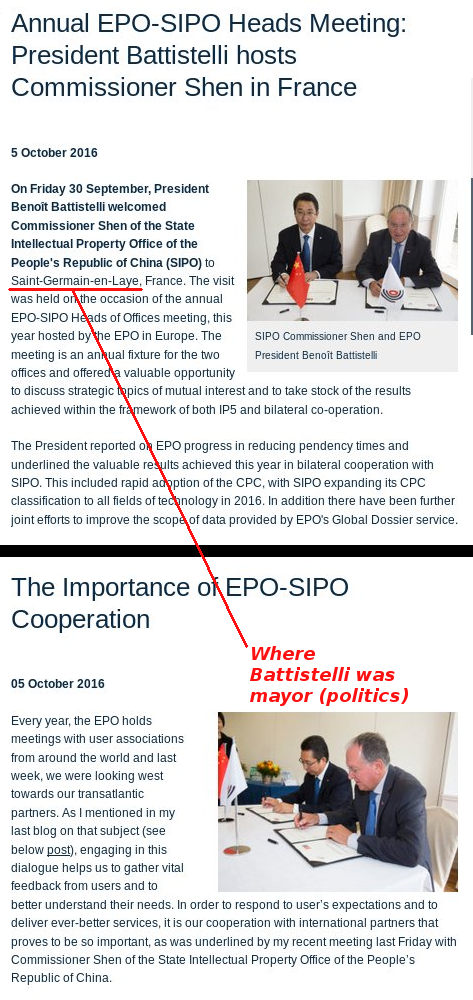

THE LAW of China is widely regarded as oppressive. Patent law too is increasingly being viewed as oppressive because companies that are innocent of infringement can get in a lot of trouble and even go under.
"This may be good for Adidas (which is advertised in this interview), but what about much smaller companies? Adidas can afford plenty of lawyers, others cannot."A few days ago Foxconn's patents person was given a platform by IAM, another site by (and for) the patent microcosm. Foxconn is a truly massive corporation, unlike the vast majority of companies in Taiwan/China. Should we not be hearing the voices of those on the receiving end of endless litigation and fear?
Inadvertently, the patent trolls' lobby (IAM) recognises that China grants too many rubbish quality patents. It's too much to keep abreast of, especially for small companies which lack a legal department. Here is what IAM wrote:
China is a particular challenge, especially when it comes to what is publically [sic] available in official information. For example, as things stand, it is often a lot more difficult to find user-friendly platforms on a par with what’s available to follow things like patent assignments in the US. This is no doubt an area that will improve as the country’s IP industry matures; while in fields like the use of big data, there are indications that China is ahead of other jurisdictions, something Jou himself has discussed with IAM.
#IPforSMEs is a hashtag that the EPO repeats every day this month.
"The EPO's management wants to believe that receiving more patent applications from China might save the EPO.""Litigation is a last but important resort when it comes to fighting wilful infringement," it said some days ago, adding the obligatory #IPforSMEs hashtag. The first two tweets of Thursday [1, 2] had the hashtag and said: "Developing an IP strategy might have much more benefits than you'd expect."
No connection whatsoever to SMEs. The first two tweets and also the last of the day just keep talking about "SMEs", but very much like in China, the EPO tries hard to distract from its harm to SMEs (the UPC, for example, would be a huge blow to SMEs; it be of no benefit to them as they often operate locally, not EU-wide). The first tweet of Friday was also accompanied by the #IPforSMEs hashtag.
Get the pattern?
"A long time ago we warned that China's (or Xi's) approach to patents would come to haunt and harm China. We were right."Remember that China's patents are rubbish in terms of quality. Totally garbage. This isn't a secret and it's not an insult. The country is just trying to game the numbers at SIPO and WIPO. And guess what... it's working. As IP Watch put it 3 days ago: "Innovators around the world filed 3.1 million patent applications in 2016, up 8.3 percent in a seventh straight yearly increase, WIPO’s annual World Intellectual Property Indicators (WIPI) report shows. The report, WIPO’s annual report, released at the United Nations in Geneva today, showed China topping patent, trademark and design filings in 2016."
Well, it's all about China, but the above yardstick is totally oblivious to quality or uniqueness of patents. They muddy the water.
A long time ago we warned that China's (or Xi's) approach to patents would come to haunt and harm China. We were right. China has become 'home' to a parasite no other country in the world actually wants; it's now full of patent trolls and sharks; locals are complaining. Here is how IAM put it:
The introduction of specialised IP courts has ushered in a new era in Chinese patent litigation. Recent statistics from the Beijing IP Court lift the veil on an enticing jurisdiction for patent owners
Today, we are announcing that Microsoft Azure IP Advantage will be available in China beginning October 1, 2017, ensuring that Azure customers in China can enjoy the same great IP protection benefits as customers in the rest of the world. Microsoft chief IP counsel Erich Andersen, writing on the Microsoft Azure blog....
A report in Chinese media states that an HTC-owned invention patent with a relatively recent grant date recently emerged from an invalidation proceeding before China’s SIPO Patent Re-examination Board (PRB) largely unscathed. The challenger was Chinese smartphone maker Gionee – a relatively small player in the domestic market that also sells devices in India and Southeast Asia. The patent, a grant covering “Mobile device and antenna structure” issued by SIPO in December 2016, also has US family members.
"Over-regulation in the form of over-patenting tends to suppress and depress innovation/production."China has traditionally been stigmatised as a "pirate", "thief" or "imitator" with "knockoffs" and "counterfeits". China seems eager to change that perception, but at what cost? What actually gave China plenty of competitive edge was the lack of bureaucratic red tape. Over-regulation in the form of over-patenting tends to suppress and depress innovation/production. ⬆